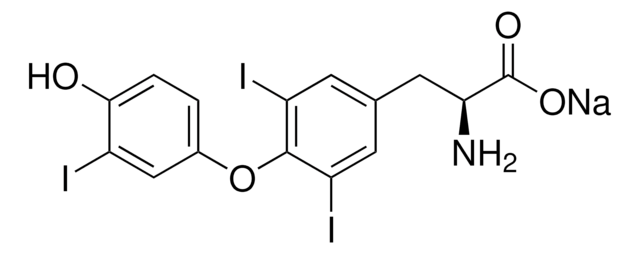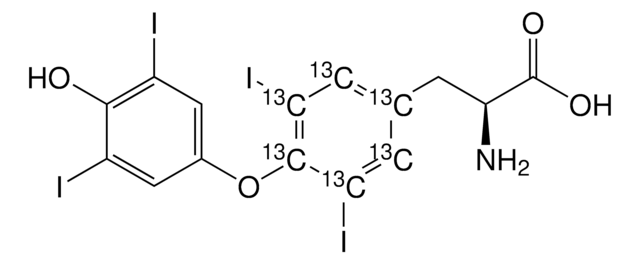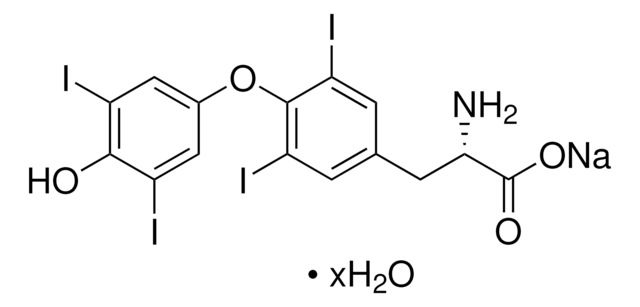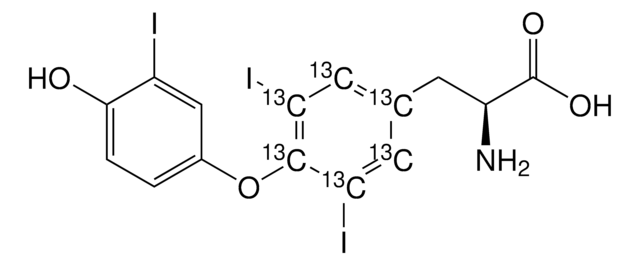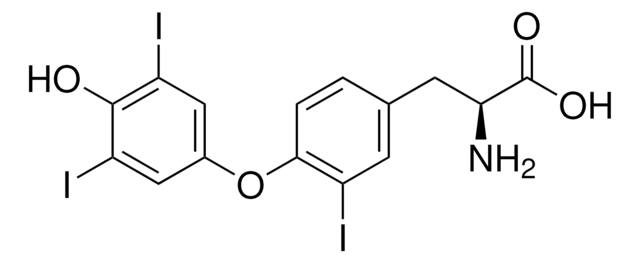T1775
L-Thyroxine
powder, BioReagent, suitable for cell culture
Synonyme(s) :
3,3′,5,5″-Tetraiodo-L-thyronine, 3-[4-(4-Hydroxy-3,5-diiodophenoxy)-3,5-diiodophenyl]-L-alanine, T4
About This Item
Produits recommandés
Source biologique
synthetic
Niveau de qualité
Gamme de produits
BioReagent
Pureté
≥98% (HPLC)
Forme
powder
Puissance
5-50 ng/mL
Technique(s)
cell culture | mammalian: suitable
Pf
223 °C (dec.) (lit.)
Solubilité
4 M NH4OH in methanol: 50 mg/mL, clear to hazy, yellow
Conditions d'expédition
ambient
Température de stockage
room temp
Chaîne SMILES
N[C@@H](Cc1cc(I)c(Oc2cc(I)c(O)c(I)c2)c(I)c1)C(O)=O
InChI
1S/C15H11I4NO4/c16-8-4-7(5-9(17)13(8)21)24-14-10(18)1-6(2-11(14)19)3-12(20)15(22)23/h1-2,4-5,12,21H,3,20H2,(H,22,23)/t12-/m0/s1
Clé InChI
XUIIKFGFIJCVMT-LBPRGKRZSA-N
Informations sur le gène
human ... THRA(7067) , THRB(7068) , TTR(7276)
mouse ... Cnr2(12802)
rat ... Cnr1(25248)
Vous recherchez des produits similaires ? Visite Guide de comparaison des produits
Description générale
Application
Actions biochimiques/physiologiques
Notes préparatoires
Reconstitution
Mention d'avertissement
Danger
Mentions de danger
Conseils de prudence
Classification des risques
STOT RE 1
Organes cibles
Thyroid,Cardio-vascular system,Kidney
Code de la classe de stockage
6.1C - Combustible acute toxic Cat.3 / toxic compounds or compounds which causing chronic effects
Classe de danger pour l'eau (WGK)
WGK 3
Point d'éclair (°F)
Not applicable
Point d'éclair (°C)
Not applicable
Équipement de protection individuelle
Eyeshields, Gloves, type N95 (US)
Certificats d'analyse (COA)
Recherchez un Certificats d'analyse (COA) en saisissant le numéro de lot du produit. Les numéros de lot figurent sur l'étiquette du produit après les mots "Lot" ou "Batch".
Déjà en possession de ce produit ?
Retrouvez la documentation relative aux produits que vous avez récemment achetés dans la Bibliothèque de documents.
Les clients ont également consulté
Notre équipe de scientifiques dispose d'une expérience dans tous les secteurs de la recherche, notamment en sciences de la vie, science des matériaux, synthèse chimique, chromatographie, analyse et dans de nombreux autres domaines..
Contacter notre Service technique
